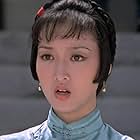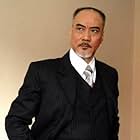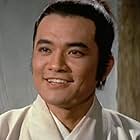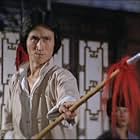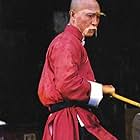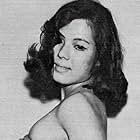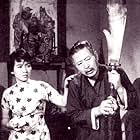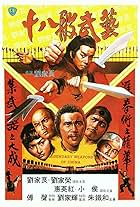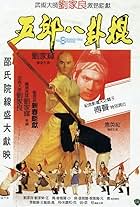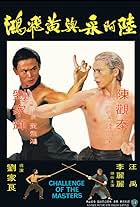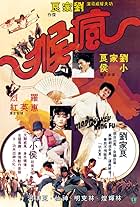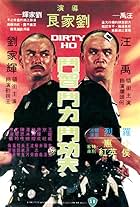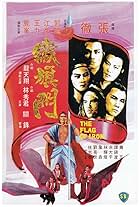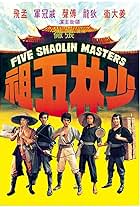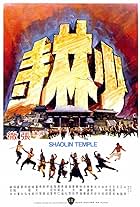Shaolin Mantis (Orig. Tang lang) is a 1978 Shaw Brothers film directed by Lau Kar-leung. Starring David Chiang and Liu Chia Hui. Shaolin Mantis tells the story of a man who learns martial ar... Read allShaolin Mantis (Orig. Tang lang) is a 1978 Shaw Brothers film directed by Lau Kar-leung. Starring David Chiang and Liu Chia Hui. Shaolin Mantis tells the story of a man who learns martial arts by observing a praying mantis.Shaolin Mantis (Orig. Tang lang) is a 1978 Shaw Brothers film directed by Lau Kar-leung. Starring David Chiang and Liu Chia Hui. Shaolin Mantis tells the story of a man who learns martial arts by observing a praying mantis.
David Da-Wei Chiang
- Wei Fung
- (as David Chiang)
Cecilia Wong
- Tien Chi-Chi
- (as Hsing-Hsiu Huang)
Norman Chu
- 4th Uncle
- (as Shao-Chiang Hsu)
Wilson Tong
- 3rd Uncle
- (as Wei-Cheng Tang)
Hoi-Sang Lee
- Mongol Fighter
- (as Hai-Sheng Li)
John Cheung
- Uncle Tien Chung
- (as Wu-Lang Chang)
- Director
- Writer
- All cast & crew
- Production, box office & more at IMDbPro
Storyline
Did you know
- ConnectionsFeatured in Films of Fury: The Kung Fu Movie Movie (2011)
- SoundtracksRonde Pour Catherine
Written by Pierre Arvay
Featured review
SHAOLIN MANTIS (1978, aka THE DEADLY MANTIS) ranks among the best work of premier kung fu director Lau Kar Leung (aka Liu Chia Liang), who's better known for THE 36TH CHAMBER OF SHAOLIN, 8-DIAGRAM POLE FIGHTER, HEROES OF THE EAST, and LEGENDARY WEAPONS OF CHINA. For the first three-quarters of its 102-minute length, MANTIS is more of a drama with kung fu scenes than a traditional martial arts film, as it builds up the tensions among a clan that learns of a traitor in its midst, but one they must tolerate in order to keep the clan patriarch's granddaughter happy. It's a complex story, slowly and deliberately crafted, that, for the most part, avoids casting anyone as good guy or bad guy. Every character has clearly understandable motives and the impending clash of loyalties is inevitable, but no less heartbreaking for being so.
David Chiang plays Wei Fung, a young scholar recruited by the Emperor to infiltrate the Tien Clan in order to get evidence of the clan's connection to Ming loyalists and anti-Ching activities. If Wei fails in his mission, his own well-connected family will be punished. He infiltrates the clan by serving as tutor to Chi-Chi (Cecilia Wong Hang-Sau, aka Huang Hsin-Hsiu), the spoiled teenaged granddaughter of Tien (Lau Kar Wing). When Tien investigates Wei's background and finds out who he really is, lovestruck Chi-Chi saves Wei's life by marrying him and promising Tien that Wei will never leave the village. Eventually, Wei must get the information he has gathered back to the Emperor or his own family will suffer. This puts Chi-Chi in a difficult position and forces her to have to choose between husband and family. Although they are slow in coming, just after the midway point there are a number of intense fight scenes--a mix of straight kung fu and sword- and spear-play--featuring six major kung fu performers: Chiang, Lau, Lily Li, Wilson Tong, Norman Chu and John Chang.
However, at the ¾ point, the film sharply shifts gears into more traditional kung fu territory, sending David's character alone into the wild to observe a praying mantis and develop the mantis style of fighting. He then returns to continue the fight. After some typically furious Lau Kar Leung-staged fights in the last 20 minutes, there is a genuinely surprising twist ending. The problem here is that the dramatic momentum built up by the interplay of moral obligations and family dynamics is somewhat dissipated, replacing intricate and complex character interaction with a final half-hour of more conventional kung fu practice and combat, albeit superbly done.
The film is beautifully crafted and staged on lavish sets at the Shaw Bros. studio. The screenplay is by Szeto An (evidently filling in for regular Shaw Bros. scribe I Kuang and doing a great job). The fights are not quite as intricate as Lau's best fights (see 8-DIAGRAM POLE FIGHTER, HEROES OF THE EAST, and LEGENDARY WEAPONS OF CHINA), but they still rank among the best of the genre, particularly the final fight between David Chiang and Lau Kar Wing. Chiang may not have been as skilled a fighting star as Gordon Liu and Alexander Fu Sheng, but he was a fine actor and, when guided by the best fight directors, could put on a good show amidst better fighters.
The real discovery in this film is actress Huang Hsin-Hsiu (aka Wong Hang Sau), who plays Chi-Chi. She's not only a competent fighter, but a powerful actress, mixing playful moments with strong dramatic scenes. For the first three-quarters, the film is really hers. Also in the cast are the great fighting femme Lily Li (as Chi-Chi's mother), Lau Kar Wing (aka Liu Chia-Yung, the director's brother), Norman Chu, and Wilson Tong (who also served as co-fight choreographer with the director). Gordon Liu makes a cameo appearance as (what else?) a monk who fights David briefly in the opening sequence. Special mention should also be given to the praying mantis that shares a few scenes with David. Either this is an expertly crafted moveable model or an incredibly well-trained mantis! (Truth to tell, it looks real to me.)
While the film's structural flaw is not fatal, it does keep it from being one of the absolute best of the kung fu genre. Still, fans of Shaw Bros. films who don't mind drama and characterization mixed in with martial arts will be amply rewarded.
David Chiang plays Wei Fung, a young scholar recruited by the Emperor to infiltrate the Tien Clan in order to get evidence of the clan's connection to Ming loyalists and anti-Ching activities. If Wei fails in his mission, his own well-connected family will be punished. He infiltrates the clan by serving as tutor to Chi-Chi (Cecilia Wong Hang-Sau, aka Huang Hsin-Hsiu), the spoiled teenaged granddaughter of Tien (Lau Kar Wing). When Tien investigates Wei's background and finds out who he really is, lovestruck Chi-Chi saves Wei's life by marrying him and promising Tien that Wei will never leave the village. Eventually, Wei must get the information he has gathered back to the Emperor or his own family will suffer. This puts Chi-Chi in a difficult position and forces her to have to choose between husband and family. Although they are slow in coming, just after the midway point there are a number of intense fight scenes--a mix of straight kung fu and sword- and spear-play--featuring six major kung fu performers: Chiang, Lau, Lily Li, Wilson Tong, Norman Chu and John Chang.
However, at the ¾ point, the film sharply shifts gears into more traditional kung fu territory, sending David's character alone into the wild to observe a praying mantis and develop the mantis style of fighting. He then returns to continue the fight. After some typically furious Lau Kar Leung-staged fights in the last 20 minutes, there is a genuinely surprising twist ending. The problem here is that the dramatic momentum built up by the interplay of moral obligations and family dynamics is somewhat dissipated, replacing intricate and complex character interaction with a final half-hour of more conventional kung fu practice and combat, albeit superbly done.
The film is beautifully crafted and staged on lavish sets at the Shaw Bros. studio. The screenplay is by Szeto An (evidently filling in for regular Shaw Bros. scribe I Kuang and doing a great job). The fights are not quite as intricate as Lau's best fights (see 8-DIAGRAM POLE FIGHTER, HEROES OF THE EAST, and LEGENDARY WEAPONS OF CHINA), but they still rank among the best of the genre, particularly the final fight between David Chiang and Lau Kar Wing. Chiang may not have been as skilled a fighting star as Gordon Liu and Alexander Fu Sheng, but he was a fine actor and, when guided by the best fight directors, could put on a good show amidst better fighters.
The real discovery in this film is actress Huang Hsin-Hsiu (aka Wong Hang Sau), who plays Chi-Chi. She's not only a competent fighter, but a powerful actress, mixing playful moments with strong dramatic scenes. For the first three-quarters, the film is really hers. Also in the cast are the great fighting femme Lily Li (as Chi-Chi's mother), Lau Kar Wing (aka Liu Chia-Yung, the director's brother), Norman Chu, and Wilson Tong (who also served as co-fight choreographer with the director). Gordon Liu makes a cameo appearance as (what else?) a monk who fights David briefly in the opening sequence. Special mention should also be given to the praying mantis that shares a few scenes with David. Either this is an expertly crafted moveable model or an incredibly well-trained mantis! (Truth to tell, it looks real to me.)
While the film's structural flaw is not fatal, it does keep it from being one of the absolute best of the kung fu genre. Still, fans of Shaw Bros. films who don't mind drama and characterization mixed in with martial arts will be amply rewarded.
- BrianDanaCamp
- Nov 13, 2001
- Permalink
- How long is Shaolin Mantis?Powered by Alexa
Details
- Release date
- Country of origin
- Language
- Also known as
- Deadly Mantis
- Production company
- See more company credits at IMDbPro
- Runtime1 hour 36 minutes
- Sound mix
- Aspect ratio
- 2.35 : 1
Contribute to this page
Suggest an edit or add missing content








